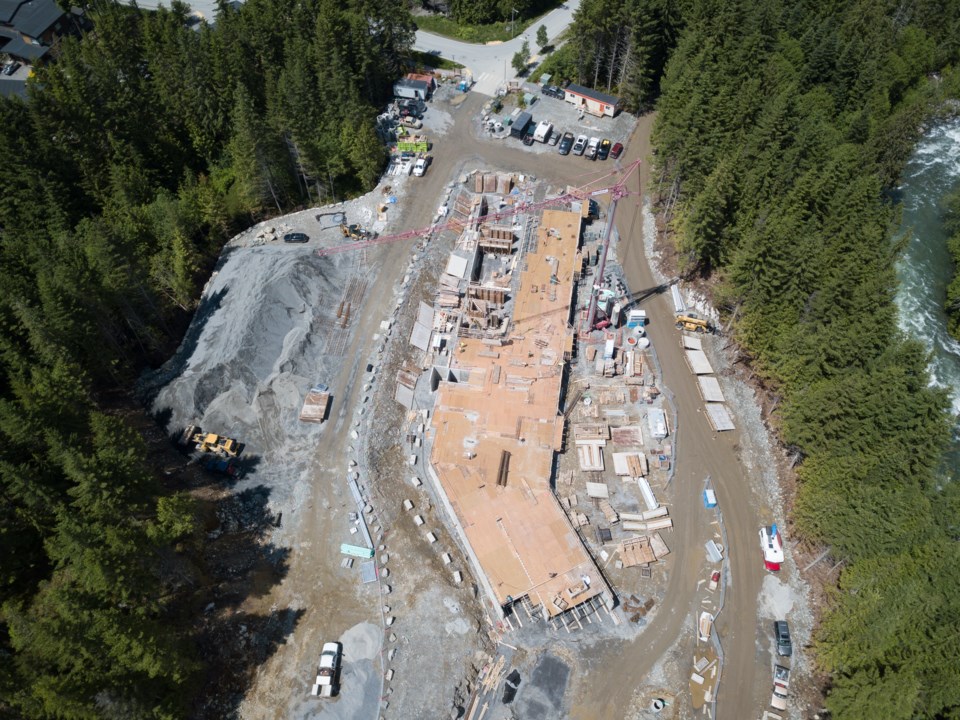The Whistler 2020 Development Corp (WDC) is looking for alternative funding for two new buildings underway in Cheakamus Crossing Phase 2 after missing out on grants from BC Housing—and the result might be more units available for ownership.
“We’re dealing with Royal Bank right now on the construction financing … [and] because we didn’t get the grants, we can’t do rental, so we’re going to do affordable home ownership on both those buildings,” said WDC chair Eric Martin.
“Which is really good, because nothing has really been offered to the affordable home ownership lists, basically since the Olympics and the bit in Rainbow.”
The WDC expects the builds to cost about $37 million, including contingencies.
Between the two buildings, there will potentially be 100 new units available for purchase, while the WDC board is also beginning design work on two smaller rental buildings to be constructed on the neighbouring parcel.
Once fully developed, Phase 2 will add about 295 units of employee housing and 18 market for-sale lots.
The sale of the market lots is expected to generate between $15 million and $17 million, which the WDC will use as seed money to start the two buildings currently underway, as well as to start paying down its outstanding debt with the Resort Municipality of Whistler.
“There is no grant money, so we’ve got to inject the cash in to make this thing work, and we also have to do all the infrastructure,” Martin said.
“So the only way to do that is to sell market lots; there’s absolutely no other way.”
As it relates to the WDC debt, Martin and the three other past board members of the original iteration of WDC recently wrote a letter to mayor and council outlining its history, some of which they felt was overlooked in past presentations to council.
In the letter, the WDC directors pointed out that the corporation (an independent subsidiary of the Resort Municipality of Whistler) previously transferred three parcels of land to the Whistler Housing Authority to be used for employee housing that otherwise would have been used to retire the outstanding debt.
The RMOW also added the cost of paying out $5,000 rebates to District Energy System users to the WDC’s debt, as well as interest, bringing the total debt load to about $9.9 million.
The WDC aims to start paying back the debt by selling the 18 market for-sale lots in Cheakamus Phase 2.
“That’s upcoming fairly soon, and that’s going to generate enough seed money to help subsidize the affordable housing, the resident restricted housing, and also pay down the debt over time,” Martin said.
Meanwhile, a separate letter to council from Paul Boulanger of Whistler Excavations is raising concerns over the tendering process for earthwork in Phase 2.
Boulanger wrote the letter after a site visit with WDC board member and Councillor Duane Jackson, expressing disappointment in the “lack of tendering and transparency” around the ongoing site work.
“It seems unfair and unfortunate that the largest earth-moving project since the Olympics” wasn’t put to tender, Boulanger said.
“Being somebody that was left off the roster, it just feels like a slight to me, and to my staff, and I don’t even understand how it could have gone that way to begin with.”
Local contractors Corona Excavations and Coastal Mountain Excavations were invited by the WDC board to submit pricing, budgets and hourly and unit rates before signing a contract for the work.
While CME has moved on to other projects, Corona remains onsite working by the hour.
“You can’t have too many subcontractors on a site … You need to coordinate these things,” Jackson said, noting that other subcontractors currently working on site include Skytech Yarding and Hard Rock Construction.
“You just can’t have everyone, and we picked two [main contractors], and the more we found out then we ended up with a lot of unknowns.”
The WDC has three project managers focusing on different areas—Neil Godfrey, Carson Hamm and Rob Laslett—and the board meets every two months, Jackson said.
While other aspects of Phase 2, including civil and construction work, are being put to tender, the WDC opted for the hourly approach due to the unknown scope of the work, he added.
“We decide, and it’s a team effort … Ultimately you want to go to a tender as fast as you can, but you can’t do it until you’ve got the drawing, and there’s been ongoing discussions with the engineering department, they review the drawings and [make revisions], and that all becomes part of the scope of work,” Jackson said.
“And if you go to tender too early all you get is a pile of extras; that wasn’t in the drawings, that wasn’t in the specification.”



